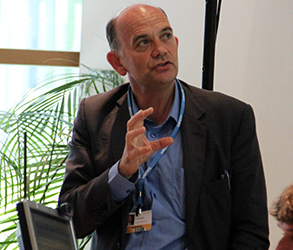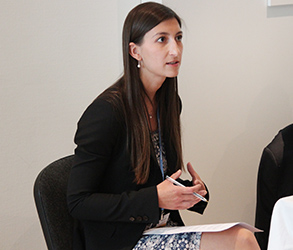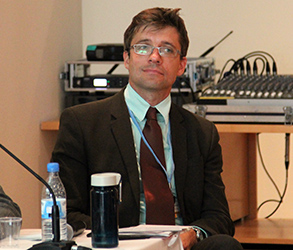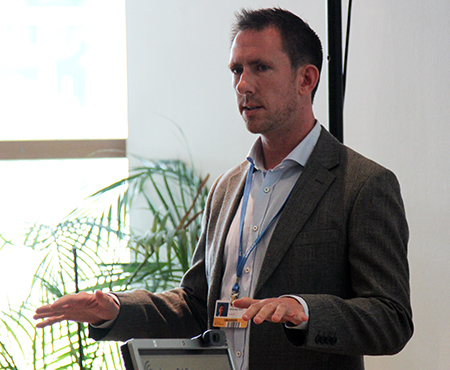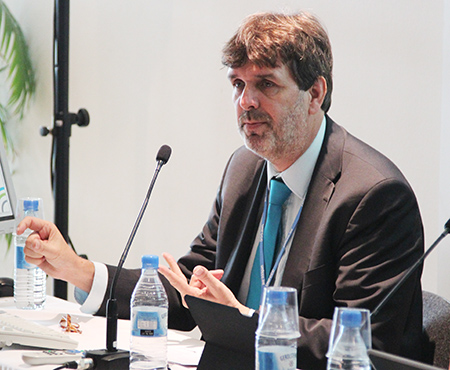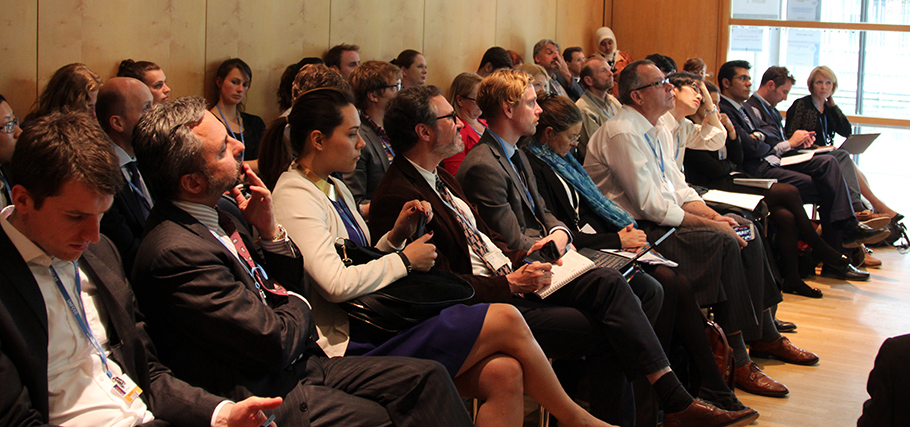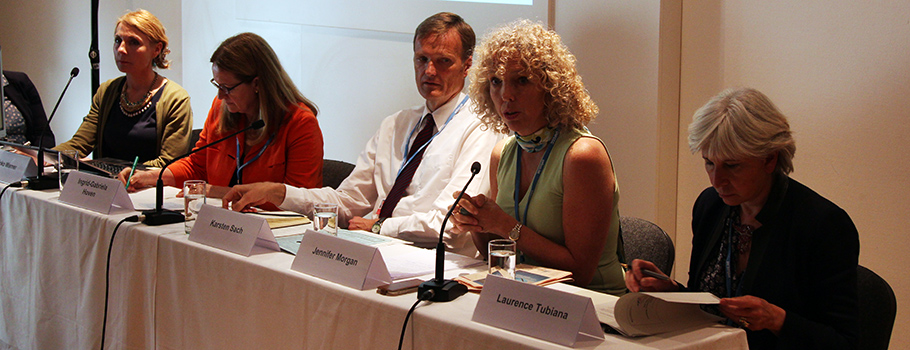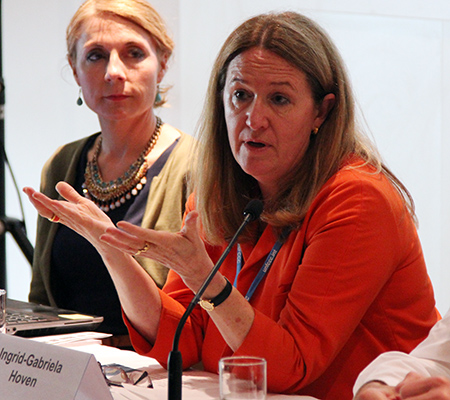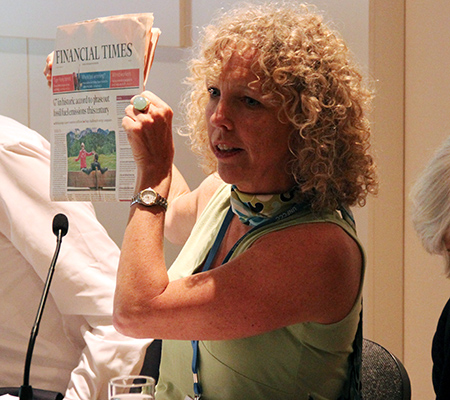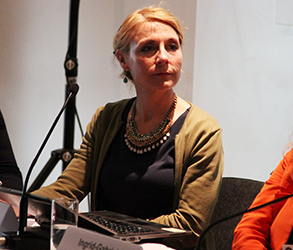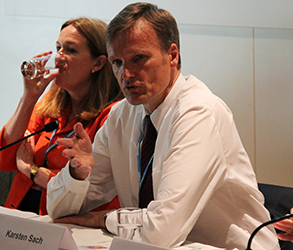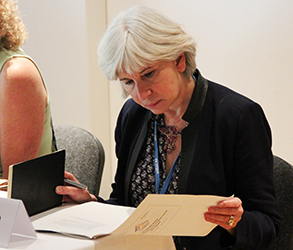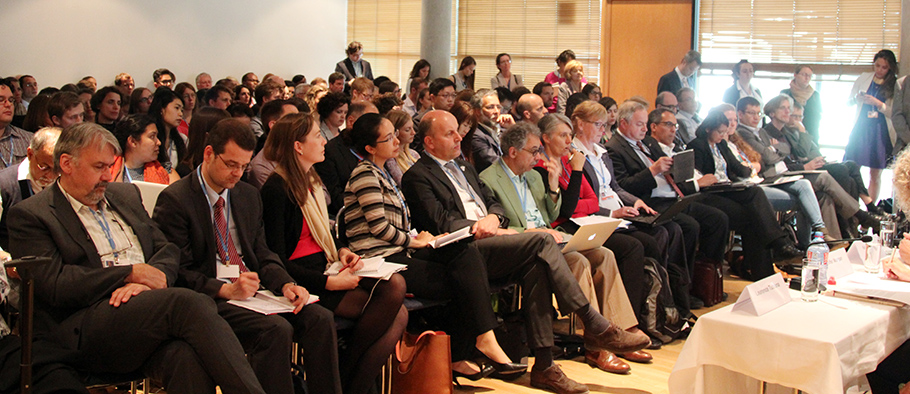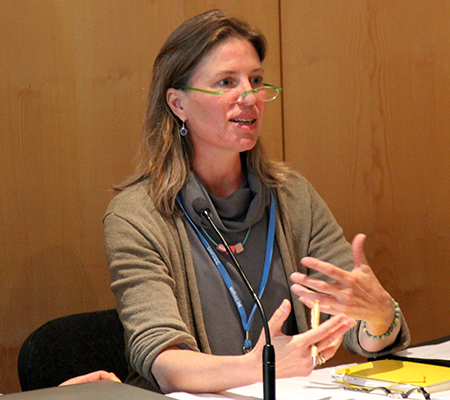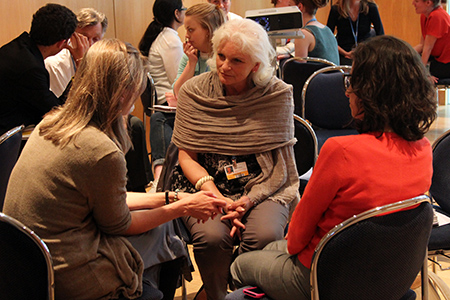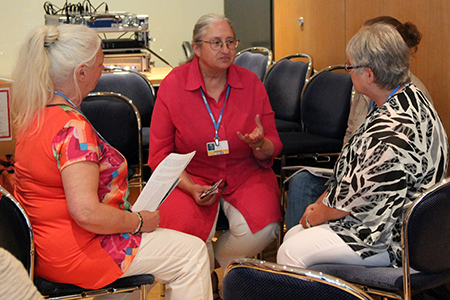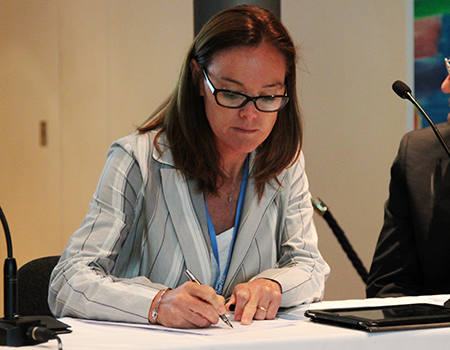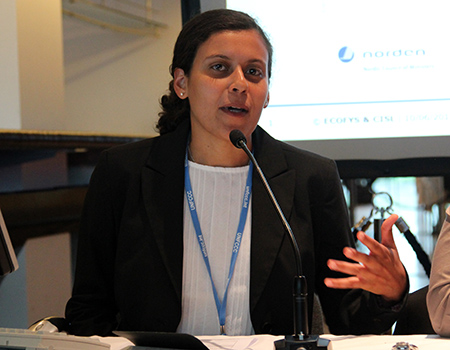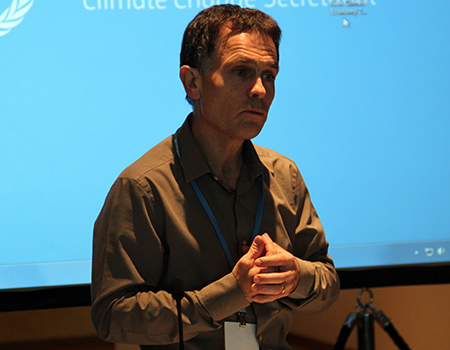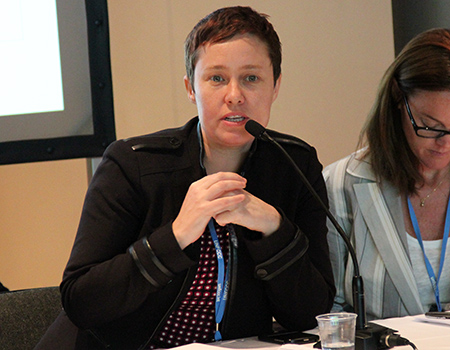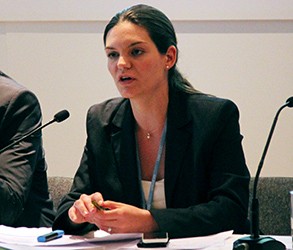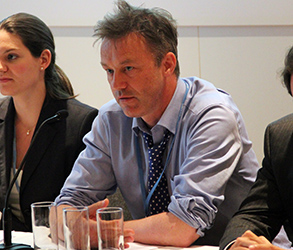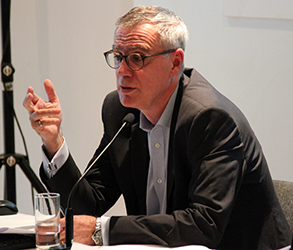Bonn Climate Change Conference - June 2015
1-11 June 2015 | Bonn, Germany
 |
 |
 |
Coverage of Selected Side Events at SBI 42, SBSTA 42 and ADP2-9
Highlights for Wednesday, 10 June 2015
Subscribe to our ENBOTS Reports |
||
|
Receive our ENBOTS bulletins and reports by email |
||

| Follow @IISDRS | ||

Loading... |
||
|
Receive emailed updates with the news articles above plus related information and announcements from our CLIMATE-L community mailing list: |
||

EU reception hosted by Latvia |
||
|
The following side events were covered by ENBOTS on Wednesday, 10 June 2015.
|
||
|
IISD Reporting Services, through its Earth Negotiations Bulletin on the Side (ENBOTS) Meeting Coverage, is providing daily digital coverage from selected side events at the Bonn Climate Change Conference - June 2015. | ||
The Role of Consumption-based Carbon Accounting (CBA) and Policies
Organized by Carbon-CAP
|
Andrzej Błachowicz, Climate Strategies, introduced the event. Arnold Tukker, Netherlands Organisation for Applied Scientific Research (TNO), presented the Carbon-CAP project, highlighting that the current accounting, target setting, and policymaking methodologies are entirely based on territorial emissions. He underlined this as a “core issue,” explaining that carbon embodied in global trade is rising more quickly than total carbon emissions. Daniel Moran, Norwegian University of Science and Technology (NTNU), explained that consumption accounting systems are based on global supply chain data, using input-output tables to create a map of the global economy and trade flows. In discussing the robustness of CBA as a policymaking basis, he noted that the models are relatively robust, with 10-20% variance, and highlighted that the biggest source of uncertainty in the models comes from the reporting of territorial emissions. Michael Grubb, University College London, spoke on consumption-oriented policies, discussing the current state of knowledge about CBA and its potential use in policymaking. He said that making further improvements on energy efficiency is likely to require a much greater focus on embodied energy. He presented research analysing 33 policy instruments, highlighting “approved technology lists” as the policy with the highest rating in the assessment, noting that it includes incentives for consumers, who are keen to buy products from the approved list, and producers, who wish to have their products on the list. Sonja Hawkins, International Centre for Trade and Sustainable Development (ICTSD), discussed the trade effects of CBA climate policy instruments, highlighting: end-stage policies such as recycling or waste requirements that can cause indirect trade impacts that can interfere with trade flows as a result of product substitution or reduction of demand for specific products; and policies such as regulatory standards or labeling requirements that can cause direct trade impacts, resulting in trade distortions. Annela Anger-Kraavi, Cambridge Econometrics, spoke on her work to assess the effectiveness, efficiency and equity of CBA reduction policies. She stated that developed countries’ consumption emissions are currently higher than the emissions produced within their borders, noting that the opposite is true for developing countries. She explained that the research would carry out interactive modeling and then run 2020-2050 scenarios, stating that she expected an outcome to be a portfolio of CBA policies that reassign the burden to developed countries Gilberto Arias, Carbon-CAP Advisory Board, spoke on the potential implications for CBA in climate change negotiations, stating that it could provide an opportunity for enabling more collaborative and cooperative low carbon development strategy arrangements between countries, noting the need for that further progress on measurement, reporting and verification aspects CBA policies. Discussions followed, considering, inter alia: coverage area of the data; economic impacts of policy choices; the importance of distinguishing between instruments and objectives; CBA in relation to forest products; potential frameworks for collaborative processes; and differences between internationally aggregated statistics and national statistics. | ||
|
|
|
|
||||
G7 Climate Action: Creating Momentum for the Global Climate Policy Agenda
Organized by the government of Germany and GIZ
|
|
|
|
This side event, organized by Germany and moderated by Ingrid-Gabriela Hoven, Federal Ministry for Economic Cooperation and Development, Germany, provided an overview of how the recently concluded Group of 7 (G7) summit in Schloss Elmau, Germany, advances momentum towards the Paris agreement. Noting that the G7’s commitment to decarbonize the global economy over the course of this century was a more concrete commitment than limiting warming to 2°C, Karsten Sach, Federal Ministry for the Environment, Nature Conservation, Building and Nuclear Safety, Germany, also highlighted the Group’s commitment to reduce greenhouse gases at the upper end of 40-70% by 2050 as recommended by the Intergovernmental Panel on Climate Change. He also highlighted the importance of re-affirming the Copenhagen Accord, especially on finance commitments. Hoven discussed initiatives launched by the G7, including: a climate risk insurance initiative that will cover up to 400 million of the most vulnerable people in developing countries by 2020; and scaling up and launching new programmes to add 10,000 MW of installed capacity in Africa to increase energy access by tackling barriers to private investment. Sach also discussed the background report on climate finance and highlighted its main findings including: global trends influencing the mobilization of finance; and improved understanding of the interactions between sources, actors, and instruments and their performances. Calling the announcement of the G7’s goal to work towards decarbonization “unprecedented,” Jennifer Morgan, World Resources Institute, said it was necessary for such a long-term goal to be supported by short-term commitments including ambitious Intended Nationally Determined Contributions (INDCs). She lauded the G7’s support for binding rules on transparency as an important political signal. Highlighting the need to build leadership in the process, Amb. Laurence Tubiana, Ministry of Foreign Affairs and International Development, France, said the G7’s strategic dialogue on carbon pricing could be a model for the UNFCCC where a club of countries could come together to create a ‘friends of carbon pricing’ group to increase the level of ambition of the Paris agreement. Koko Warner, Munich Climate Insurance Initiative, highlighted: the need to think about monitoring processes for the insurance initiative; formulation of a resilience goal in the Paris agreement; and innovative and transformative approaches to implement climate resilience programs. During discussions, participants highlighted, among others: the requisite means to get developing countries to support a global decarbonization goal; promotion of coal by export credit agencies; and the credibility of INDCs. | ||
|
|
|
|
|
||||
Moving Beyond Conflict to Build Shared Purpose
Organized by Living Witness and the Quaker UN Office (QUNO)
|
|
|
This workshop session was moderated by Laurie Michaelis, Founder, Living Witness. Lindsey Fielder Cook, Representative, Climate Change, QUNO, welcomed participants, encouraging them to explore their own conflicts with other participants in the room in order to understand how to best work through them. | ||
|
|
|
||||
Better Growth, Better Climate: Intended Nationally Determined Contributions (INDCs),
Economic Development and Opportunities for International Cooperation
Organized by the University of Cambridge, the New Climate Economy (NCE) and Ecofys
|
|
|
This event was moderated by Nicolette Bartlett, University of Cambridge. Michael Jacobs, NCE, spoke about the potential for multistakeholder cooperation to foster growth-enabling mitigation actions. He highlighted two “overlapping categories” that will play a key role in driving progress towards low carbon economies: non-state actors and international cooperation. He stated that the Paris agreement would create the “enabling conditions” upon which actions would occur, highlighting several mitigation actions that are also beneficial to states, cities and regions in ways unrelated to climate benefits. Michelle Bosquet, Ecofys, presented lessons from five cooperative initiatives carrying out mitigation actions. She noted that the incentives for government actors and the private sector to be part of these initiatives include: the need to stay competitive in future markets; the need to share knowledge and best practices with like-minded others; the need to enhance sector-specific gains in mitigation; and the desire to support companies carrying out similar actions. Reiterating her subnational government’s commitment to “take on climate change” through their ambitious INDC, Susanna Rivero Baughman, Government of Catalonia, Spain, highlighted current policy targets for 2020, which include: increasing energy efficiency by 20%; lowering carbon emissions by 25% in relation to 2005; and increasing to 20% the renewable energy share in gross final energy consumption. She highlighted Catalonia’s initiatives to encourage emissions reductions in the private sector and further noted areas of international cooperation with other state and regional level governments, announcing Catalonia's intention to donate 0.7% of income to development finance. Rodolfo Lacy, Mexico, detailed his government’s initiatives to involve local and subnational authorities, non-governmental organizations and the private sector in climate change actions, noting that this involvement is legislated in national policy. He stressed that local authorities are better able to implement policies as they are closer to the citizenry, and called for these actors to be given the freedom, financial and technical support to do so. In the discussion, participants considered whether ambitious actions by subnational actors could lower national ambition; how subnational entities are linked to processes under the UNFCCC, particularly regarding INDCs; the political placement of subnational actions under the UNFCCC. Panelists noted that, inter alia, ex-post, subnational contributions are included within national contributions, and ex-ante, subnational commitments can raise national ambition; and remarked on the need for vertical integration of INDCs at all policy levels. | ||
|
|
|
||||
Provisions for Market Mechanisms in the 2015 Agreement
Organized by the Centre for European Policy Studies (CEPS)
|
|
|
|
Andrei Marcu, CEPS, presented the Centre’s paper regarding provisions on market mechanisms that could be placed in the 2015 agreement and noted that the precise nature of the provisions would depend on the agreement’s architecture. He discussed potential provisions, including: ability to transfer emissions internationally to be compliant with Intended Nationally Determined Contributions (INDCs); an international baseline and credit mechanism under the Conference of the Parties (COP); and validation of domestically created units by the COP to allow compliance with INDCs. Responding to the presentation, Laurence Mortier, Switzerland, emphasized the importance of environmental integrity and prevention of double counting for her country, and called for a facilitative process via the Paris agreement that would allow a “race to the top” on the quality of emissions reductions. Noting the EU’s target of achieving 40% emissions reductions domestically by 2030 below 1990 levels, Martin Hession, European Commission, said market mechanisms can still play a major role in enhancing ambition. He called for focusing on accounting rules and standards, general principles governing market mechanisms, and the use and compatibility of systems outside of the UNFCCC. Contrasting the bottom-up system of INDCs for the Paris agreement with the more top-down Kyoto Protocol, Marcelo Theoto Rocha, Brazil, highlighted that this increased complexity and called for comparability and compatibility of efforts and accounting. Maosheng Duan, China, stressed that the technical choices were clear but political choices had to be made. On the role of market mechanisms in INDCs, he said countries could clearly indicate that their contributions were contingent on the availability of crediting processes. He said, however, sector-specific reductions in the host country would be more difficult to make operational. During discussions, participants considered: the nature of institutional arrangements and the possibility of using the UNFCCC COP as the interim Meeting of the Parties of the new agreement; the fate of Kyoto mechanisms beyond 2020 and their status in the new agreement; the role of agriculture and forestry in crediting mechanisms, including the possibility of compensating for reversibility of such sectors; the types of INDCs and how they would inform the design of crediting mechanisms; the engagement of the business sector in the design of crediting mechanisms; and the possibility of embedding subnational emissions trading systems into a UNFCCC mechanism. | ||
|
||||
|
The Earth Negotiations Bulletin on the side (ENBOTS) © <enb@iisd.org> is a special publication of the International Institute for Sustainable Development (IISD). This issue has been written by Rishikesh Ram Bhandary, Tallash Kantai and Gillian Nelson, Ph.D. The Digital Editor is Mike Muzurakis. The Editor is Dan Birchall <dan@iisd.org>. The Director of IISD Reporting Services is Langston James “Kimo” Goree VI <kimo@iisd.org>. Specific funding for coverage of side events through ENBOTS has been provided by the Kingdom of Saudi Arabia. The opinions expressed in ENBOTS are those of the authors and do not necessarily reflect the views of IISD and funders. Excerpts from ENBOTS may be used in non-commercial publications only with appropriate academic citation. For permission to use this material in commercial publications, contact the Director of IISD Reporting Services at <kimo@iisd.org>. Electronic versions of issues of ENBOTS from the Bonn Climate Change Conference - June 2015 can be found on the Linkages website at http://enb.iisd.org/climate/sb42/enbots/. The ENBOTS Team at the Bonn Climate Change Conference - June 2015 can be contacted by e-mail at <tallash@iisd.org>. | ||
has been provided by the Kingdom of Saudi Arabia and the European Union


IISD Reporting Services is grateful to the many donors of the Earth Negotiations Bulletin (ENB) and recognizes the following as core contributors to the ENB: the European Union, the Finnish Ministry for Foreign Affairs, the German Federal Ministry for the Environment, Nature Conservation, Building and Nuclear Safety (BMUB), the International Development Research Centre (IDRC), the Japanese Ministry of Environment (through the Institute for Global Environmental Strategies - IGES), the New Zealand Ministry of Foreign Affairs and Trade, the Kingdom of Saudi Arabia, SWAN International, Government of Switzerland (the Swiss Federal Office for the Environment (FOEN), the Swiss Agency for Development Cooperation (SDC), and the United Nations Environment Programme (UNEP). Funding for translation of the Bulletin into French is provided by the Government of France, the Wallonia, Québec, and the International Organization of La Francophonie/Institute for Sustainable Development of La Francophonie (IOF/IFDD).




